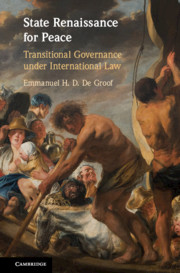Book contents
- Reviews
- State Renaissance for Peace
- State Renaissance for Peace
- Copyright page
- Dedication
- Contents
- Tables
- Foreword
- Preface
- Acknowledgements
- Additional material
- Abbreviations
- Introduction Transitional Governance Today
- Part I The Unchartered Territory of Transitional Governance
- Part II Foundation and Actors of Transitional Governance * Sources of Ius in Interregno
- 3 The Foundation of Transitional Governance
- 4 The Actors of the Interregnum
- 5 The Sources of Ius in Interregno
- Part III Self-Determination through Transitional Governance
- Part IV Moderating External Influence on Transitional Governance
- Index
3 - The Foundation of Transitional Governance
from Part II - Foundation and Actors of Transitional Governance * Sources of Ius in Interregno
Published online by Cambridge University Press: 10 September 2020
- Reviews
- State Renaissance for Peace
- State Renaissance for Peace
- Copyright page
- Dedication
- Contents
- Tables
- Foreword
- Preface
- Acknowledgements
- Additional material
- Abbreviations
- Introduction Transitional Governance Today
- Part I The Unchartered Territory of Transitional Governance
- Part II Foundation and Actors of Transitional Governance * Sources of Ius in Interregno
- 3 The Foundation of Transitional Governance
- 4 The Actors of the Interregnum
- 5 The Sources of Ius in Interregno
- Part III Self-Determination through Transitional Governance
- Part IV Moderating External Influence on Transitional Governance
- Index
Summary
As to the foundation of TG, TI come in all sorts of shapes and sizes. They are enshrined in international treaties, intrastate agreements or domestic legal acts and laws. The TI we examined however share a number of features. First, their origin or common ‘breeding ground’: non-constitutionality. As a central feature of contemporary TG, non-constitutionality calls for nuanced analysis as TG progressing in stages can be ‘interim-constitution-based’. Second, the method of supraconstitutionality, allowing TI to (partly) supersede, if only temporarily, both the previous and coming constitutional order. Supraconstitutionality then serves as a catalyser for the third common feature of TI: the triple purpose of pacification, self-limitation, and reconstitutionalisation.
Keywords
- Type
- Chapter
- Information
- State Renaissance for PeaceTransitional Governance under International Law, pp. 81 - 113Publisher: Cambridge University PressPrint publication year: 2020

